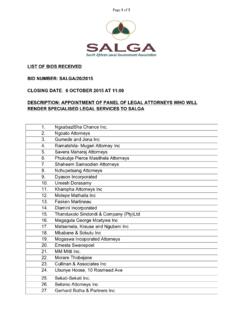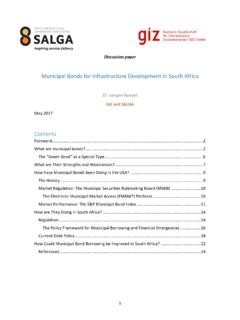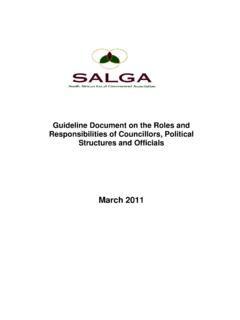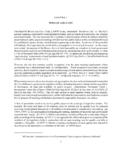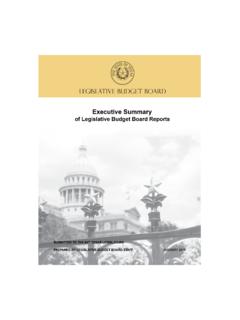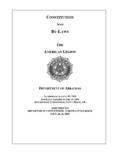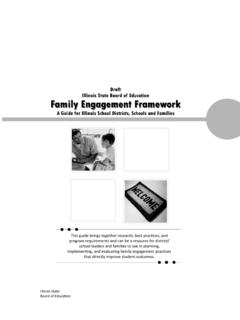Transcription of Reporting between districts and locals - SALGA
1 1 THE RELATIONSHIP between district AND LOCAL MUNICIPALITIES AND Reporting MECHANISMS 2 Introduction South Africa celebrated 21 years of its democratic system and Local Government on the 5 of December 2015, celebrated 15 years of democratic and developmental local government. Local government consists of three different types of municipalities metropolitan, district and local municipalities. The promulgation of the Local Government: Municipal Structures Act, 1998 (the Structures Act) provided the legislative framework for the consolidation and rationalisation of municipalities in accordance with the Constitution. When district councils were initially established, their functions were not clearly defined in legislation.
2 The Structures Act brought about greater clarity around the functions of district municipalities by giving them responsibility over key service delivery areas such as water, sanitation, electricity, municipal health services and other district -wide functions ( fire-fighting, passenger transport, promotion of tourism). The Structures Act further allows for the adjustment of the division of powers between the district and local municipalities. The Constitution outlined the role of districts to: a) Redistribute resources within a district according to need; b) Assist and capacitate local municipalities to enable them to provide, and sustain the provision of services in their areas; and c) Promote economic development in the district because sustainability of service provision (as well as the general well-being of the inhabitants) is dependent on a productive local economy.
3 The White paper on Local Government, 1998 identified the following four key role that district municipalities should fulfil: a) district integrated development planning as a statutory mandate of all district governments; b) To serve as infrastructural development agents, involving planning and developing bulk infrastructure in non-metro municipalities; c) The provision of technical assistance to local municipalities including facilitation the sharing of specialised capacity and equipment between municipalities, assisting in the development of cooperative relations between municipalities, assistance in the preparation of the budgets, consolidated municipal infrastructure programme applications, tenders, drafting by-laws; d) district to the point of coordination for national and provincial capacity building programmes and location of support and training infrastructure.
4 Section 88 of the Local Government: Structures Act, 1998, calls for cooperation between district and local municipalities that:- A district municipality and local municipalities within the area of that district municipality must co-operate with one another by assisting and supporting each other; A district municipality on request by a local municipality within its area may provide financial, technical and administrative support services to that local municipality to the extent that that district has the capacity to provide those support services; A local municipality may provide financial, technical or administrative support services to another local municipality within the area of the same district 3 municipality to the extent that it has the capacity to provide those support services, if the district municipality or that local municipality so requests; The MEC for local government in a province must assist a district municipality to provide support services to a local municipality.
5 Coordination between district and local municipalities The Intergovernmental Relations Framework Act, 2005 aims to foster friendly relationships within government but also to ensure that each sphere performs its functions as required by the Constitution. The objective of the Act is to give effect to the constitutional requirements regarding the structures and institutions to promote IGR and mechanisms and procedures to facilitate dispute resolution. The purpose of the legislation is to encourage coordination across the three spheres of government in the implementation of policy and legislation, but also to ensure proper co-ordination within district municipalities. The Act establishes a broad statutory framework dealing with:- Key principles of co-operative government and IGR; Intergovernmental forums that form the institutional spine of IGR; Implementation protocols that facilitate integrated service delivery; and Rules for the settlement of intergovernmental disputes.
6 The Act in particular provides for district Inter-governmental forums. Section 26 of the Act provides for the role and mandate of district forum: Serve as consultative forum for the districts municipality and the local municipalities in the district to discuss and consult each other on matters of mutual interest, including- o Draft national and provincial policy and legislation relating to matters affecting local government interests in the district ; o The implementation of national and provincial policy and legislation with respect to such matters in the district ; o Matters arising in the Premier s intergovernmental forum affecting the district ; o Mutual support in terms of section 88 of the local government: Municipal Structures act, 1998 (Act No.)
7 117 of 1998); o The provision of services in the district ; o Coherent planning and development in the district ; o The co-ordination and alignment of the strategic and performance plans and priorities objectives and strategies of the municipalities in the district ; and o Any other matters of strategic importance which affect the interests of the municipalities in the district The forum therefore creates a valuable forum where the district municipality and all its local municipalities can meet to ensure integrated and co-ordinated planning to eliminate duplication of effort and to ensure effective and efficient service delivery to the community. As the Act provides for the establishment of technical forums, the co-4 ordination can also find expression in the administration of the participating municipalities.
8 The Act requires each such district IGR forum to adopt internal rules that deal with: The name and terms of reference of the IGR structure; The role of the chairperson; Chairing of the forum in the absence of the chairperson; Frequency of meetings and how meetings are convened; Procedures for decision making; Procedures for dispute resolution; and Procedure for changing internal rules. The terms of reference should be informed by the strategic issues in all participating municipalities, and must be informed by the IDPs and SDFs of the participating municipalities. The terms of reference can be amended from time to time in accordance with the internal rules to ensure that it remains relevant. Each district intergovernmental forum should adopt its own internal rules, but the Act requires that, at least once every year, the DIF must conduct a meeting with stakeholders involved with development in the district , such as service providers.
9 The district municipality must provide the secretariat for the DIF and the secretariat must ensure that it compiles an annual report of resolutions taken; reflecting on the achievements and progress made with regard to such resolutions. Section 29 of the Act indicates that the role of inter-municipality forum is to serve as a consultative forum for the participating municipalities to discuss and consult each other on matters of mutual interest, including- (a) Information sharing, best practise and capacity building initiatives; (b) Co-operating on municipal development challenges affecting more than once municipality; and (c) Any other matter of strategic importance which affects the interests of the participating municipalities.
10 The establishment of inter-municipal forums is not only to foster cooperative relations but to promote coordination and encourage the spirit of Reporting within the local government sector. Municipalities are encouraged to ensure the establishment of district IGR forums and to review the terms of reference to ensure maximum co-ordination and integration within the district . Participation of local municipalities in district municipalities Section 23 of the Structures Act provides for the appointment of councillors from local municipalities to represent such local municipalities in the district council. The purpose of such representation is twofold: To ensure that the critical aspects affecting local municipalities come to the attention of the district ; and 5 To ensure that the local municipality is fully informed of the plans, programmes and actions of the district .



